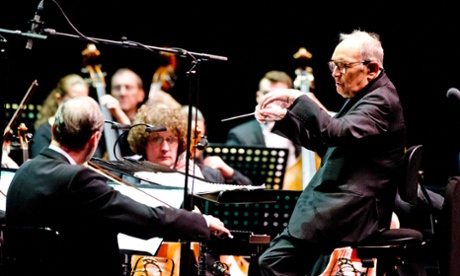Announcements of farewell tours are invariably greeted with scepticism. Frank Sinatra “retired” in 1971 but went on to play a thousand further shows; countless artists have bade their fans a tearful adieu only to make a self-serving return, often after an indecently short interval. Tonight, though, feels like the real deal.
Having soundtracked more than 500 films, and worked with great directors from Leone and Bertolucci to Almodóvar and Tarantino, Ennio Morricone is among the most prolific and influential movie composers of all time. He is now 90 and this 60 Years of Music tour, accompanied by the Czech National Symphony Orchestra and the Crouch End Festival Chorus, definitively brings the curtain down on a staggering career.
The standing ovations as this small, bowed figure, all in black, makes his way to the conductor’s podium are a ritual now, as is the barely disguised impatience with which he receives them. It is remarkable that a figure from so rarefied a field can fill the O2, yet Morricone, famously allergic to celebrity, appears to be willing the applause to end.
The set with which he has chosen to climax his live-performance career is naturally fairly crowd-pleasing. To open, the lush string sweeps and atonal interventions of his theme to 1998 Italian movie The Legend of 1900 are followed by the light-as-air 1971 composition Chi Mai, which became an unlikely No 2 hit in the UK 10 years later, after featuring in a TV series about David Lloyd George.
Morricone’s forte has always been the devastatingly simple chord sequences that encapsulate so much human emotion, drama and beauty. His grand orchestration is built on beguiling intimacy. When soprano and long-time collaborator Susanna Rigacci joins him for selections from the 1997 TV adaptation of Conrad’s Nostromo, the flurries of agitated brass sound like acts of mutiny.
Many of the thousands here tonight are drawn by his totemic themes to Sergio Leone’s 60s spaghetti westerns, and their mid-set introduction triggers raucous cheers. Morricone’s insidious leitmotifs were so fundamental to Leone’s movies that the director would play them to the cast on the set while filming. The whistling motif of The Good, the Bad and the Ugly will forever provoke mental images of a sharp-shooting, cheroot-chewing Clint Eastwood separating a Stetson-wearing head from its owner’s shoulders.
After a 34-year break, Morricone returned to scoring westerns in 2015 with Tarantino’s The Hateful Eight, for which he won his sole Oscar, although bassoon- and tuba-heavy symphonies such as Last Stage Coach to Red Rock initially nonplussed the director. It sounds tremendous here, as do the pieces with fado-referencing Portuguese vocal soloist Dulce Pontes, who brings shoulder-heaving melodrama to the abrasive theme to 1971 Italian docudrama Sacco & Vanzetti.
The epic grandeur of Morricone’s lush symphonies falls so easily into exquisite melancholy, and this is the signature note of tonight’s final passage of themes from Roland Joffé’s Oscar-winning 1986 period drama The Mission, haunted by chorales, Spanish guitars and pan pipes. Taking his leave after the liturgical On Earth As It Is in Heaven, with choral voices lifted in supplication, Morricone shuffles back for three encores before finally exiting as the unwanted applause nears the pitch of his own musical crescendos. The man they call the Maestro has left the building.











